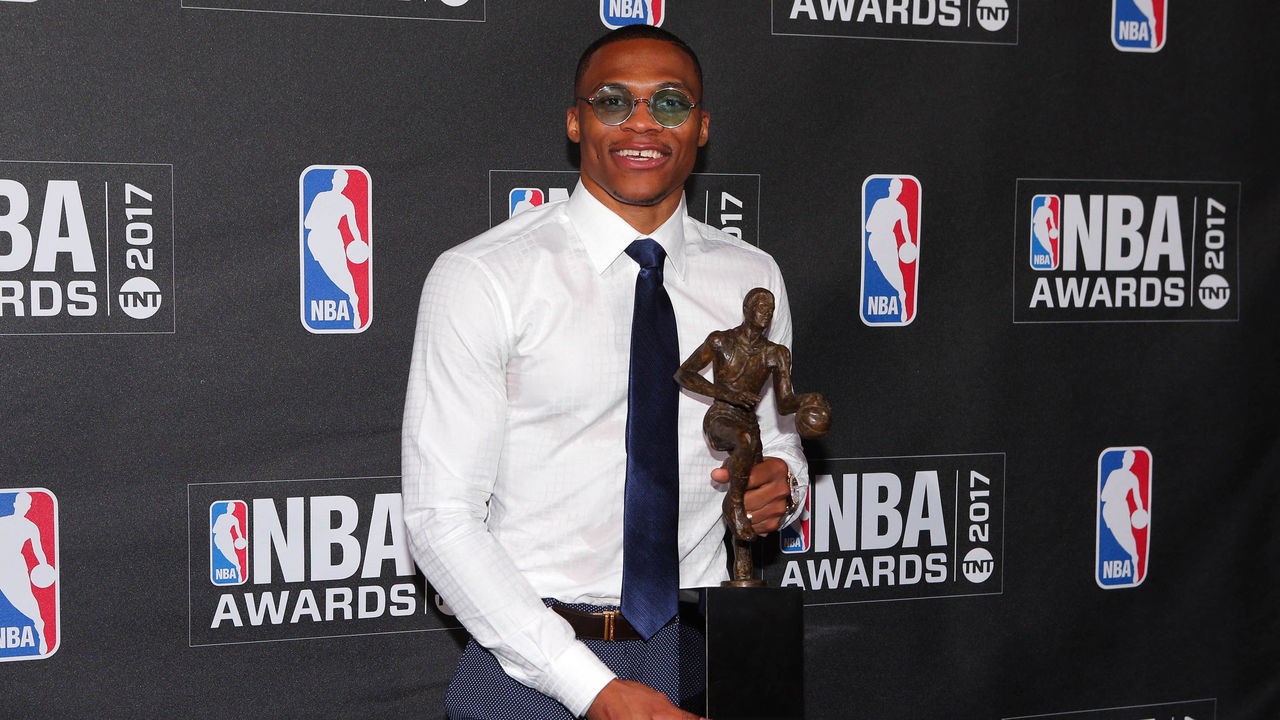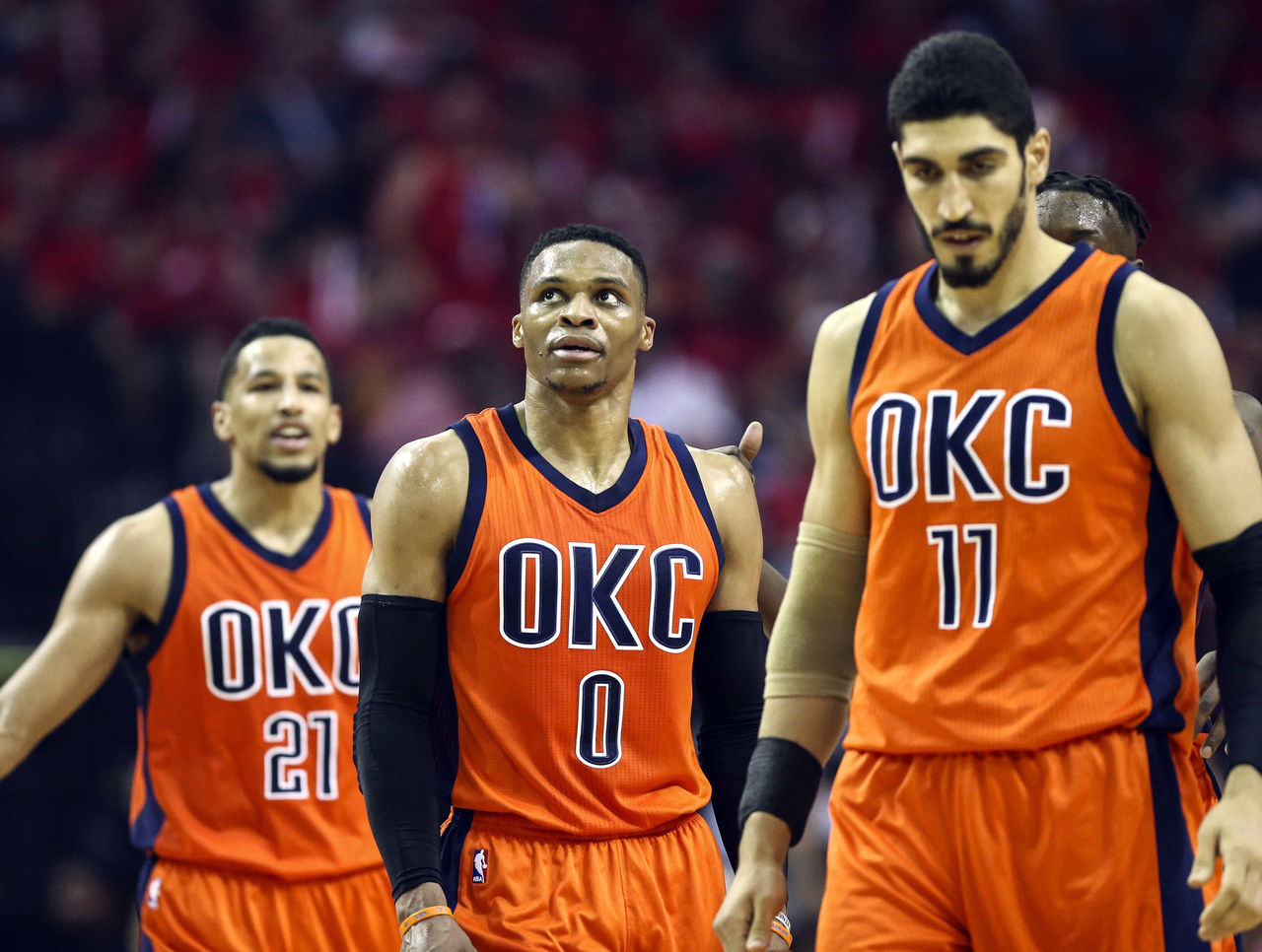In superteam era, MVP award becoming a consolation prize
At the inaugural NBA Awards show on Monday night, incandescent Oklahoma City Thunder star Russell Westbrook was named the Most Valuable Player of the 2016-17 regular season.
And how could he not?
The bulldozer of a point guard became just the second player in NBA history to average a triple-double - posting an league-best 31.6 points per game with 10.7 rebounds and 10.4 assists - over the course of an entire season. He seemingly willed his squad of unproven youngsters and role players to every one of their 47 wins.
Westbrook's David-versus-Goliath story made for must-see TV. Recall a cool Thursday in February, during the dog days of the NBA calendar - there was Russ, dropping a tidy 29-12-11 on LeBron James and the visiting Cavs in a 118-109 Thunder victory. There was no overstating Westbrook's value to his team that night.
But, with the NBA even more top-heavy than when the 2015-16 Warriors set the all-time wins record, or when LeBron's Miami Heat set the NBA on fire during the first half of the decade, a third straight Warriors-Cavaliers Finals matchup had been practically a foregone conclusion since opening night. And with the arms race at the top only intensifying further - as elite players join forces like never before - if your team fields the regular-season MVP next year, it probably isn't going to win the championship. The award is becoming a consolation prize for also-rans.

(Image courtesy: Action Images)
That's because none of Russ' regular-season heroics mattered in the end, as the Thunder were never a serious threat to be anything more than cannon fodder come playoff time. They still fought honorably, trying to show basketball pundits everywhere that yes, this team was more than Kevin Durant, and that they could survive and excel, to a point.
But that end point was Round 1. Westbrook and the Thunder were dispatched in five games by a Rockets team that was subsequently handled efficiently by the veteran Spurs. San Antonio then fell quickly - after an injury to Kawhi Leonard - to a legendarily strong Warriors championship roster. The Thunder never had a chance.
The 2016-17 MVP award ultimately went to the best player from a group of teams with winning records, but with next to no chance of winning the NBA championship. Westbrook wasn't the best player on the best team, but instead the best on the good-but-not-greats. That's the paradox of honoring singularly transcendent production in the age of the superteam, and it's a template for future MVPs to come.
LeBron is still the best player in the league, with Durant and Stephen Curry not far behind him. That trio accounted for seven of the past eight MVP winners prior to Westbrook, with some of those awards indeed coinciding with championship seasons. Those were relatively simple times, though, with greater league-wide parity. For the foreseeable future, each of them will have the pedigrees of their All-Star teammates held against them in MVP debates.
When teams with three or four stars are the only legitimate threats to win a title, the very best players on those rosters become victims of collective success. As long as these superteams exist, especially to the extent we saw this season, MVPs will continue going to the Russell Westbrooks of the league - those good enough to win in the regular season, but little else.

(Image courtesy: Action Images)
Would Westbrook have averaged a triple-double alongside superior teammates? We could soon find out, as the Thunder are reportedly considering luring free agent Blake Griffin away from the Clippers. Griffin's rebounds and assists have to come from somewhere, and Westbrook's boxscore is the logical starting point. The Thunder would undoubtedly be better, but Russ' individual star wouldn't shine quite as brightly.
Or, Westbrook could average a triple-double yet again, stuffing the stat sheet from October to March before succumbing to the same fatal truth in May. His personal dominance is the result of his team's limited potential. Will fans still be as excited about his statistics if he remains on a second-tier side?
These days, the only buzzword sure to garner more debate among basketball fans than "superteam" is "rings" - as in, "Sure, Westbrook was good in the regular season, but he doesn't have any rings." Devoid of context, the rings debate is a pointless exercise, but it's still how many fans (and some media) consume the league.
Unless something dramatic happens in the next season or two, Russ' casual supporters will turn against him because of his lack of a championship. It will be an admission from the general NBA-watching public that winning MVP doesn't mean much anymore. Maybe it never did.
Hall of Famer and current TNT analyst Charles Barkley is a template for what Westbrook could become - another legend who just couldn't cement his legacy with a championship. Barkley is one of the top 30 players ever, and yet he still has his Finals resume held against him, never mind that his prime lined up with Michael Jordan's.
Barkley won the 1992-93 MVP award. Looking back at his career, what is that distinction if not a nice consolation?